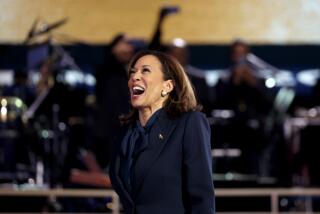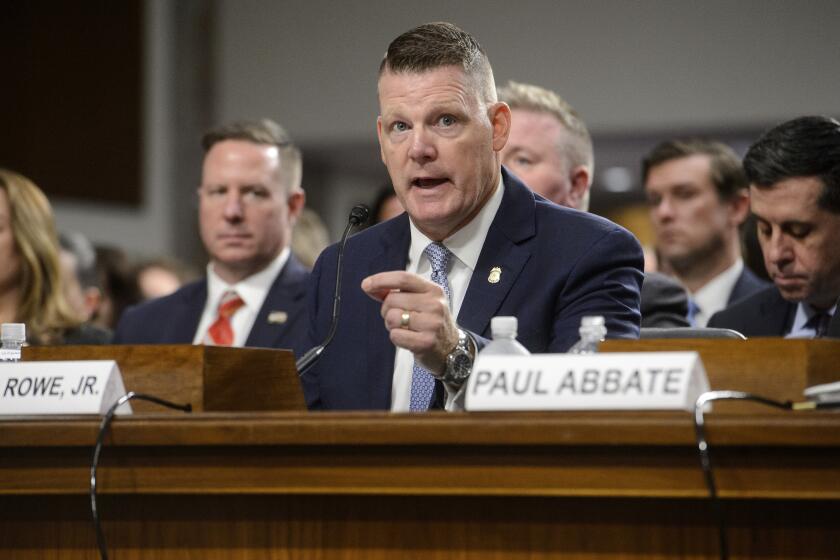Clinton Says He Failed to Tout Trade to Public
Just days before his effort to win expedited authority to negotiate trade deals faces key votes in Congress, President Clinton on Saturday candidly conceded that he has failed to convince the American people that the issue should matter to them.
“I must say that when my voice is working, sometimes I get credit for being a reasonably effective communicator,” a hoarse Clinton told a small gathering of Democratic donors. “[But] according to every public opinion survey, I have completely failed to convince a substantial majority of American people of the importance of trade to our economic development.”
The unusually frank admission is indicative of concerns within the administration on the fate of the bid to give the president additional leeway in negotiating trade treaties with other countries. This so-called fast-track authority--which other modern presidents have had--would allow Clinton to negotiate trade deals with other nations while limiting Congress’ power over such pacts to merely voting them up or down, rather then amending them.
Ironically, even as Clinton acknowledged failing to effectively make the case on fast-track, Vice President Al Gore took to the airways to press the administration’s arguments. Subbing for Clinton in delivering the president’s weekly national radio address, Gore said fast-track is necessary if the United States is to retain its global economic leadership.
“A vote against presidential trading authority is a vote against American leadership in the world--and a vote for pessimism and retreat,” Gore said.
Both houses of Congress are scheduled to take up the fast-track measure this week. Most analysts believe that the proposal will pass in the Senate, following a preliminary battle over whether to end a filibuster by opponents. But prospects for approval by the House are uncertain, in large part because some key Democrats--such as Minority Leader Richard A. Gephardt (D-Mo.)--oppose it, while other party members have yet to declare themselves on the issue.
*
The fast-track legislation has been vigorously opposed by labor and environmental groups, who contend that trade accords that Congress can’t alter would be less likely to address such issues as worker rights and industrial pollution. To make its case, the AFL-CIO has been running a $1-million television campaign attacking the bill.
Clinton is expected to launch a personal campaign this week to try to muster more backing from fellow Democrats.
The president made his comments to about 25 supporters at a lucrative fund-raising weekend retreat for the Democratic National Committee. Although Clinton’s voice was obviously strained, he managed to participate in three small panel discussions with donors who paid a $50,000 fee for the right to share their views with him and other administration leaders at a luxurious beachfront resort near Jacksonville, Fla.
Clinton expressed his exasperation on the fast-track issue in a tangent while commenting about education and child care. The fact that he veered off the subject illustrated how worried he is about the prospects of his trade legislation, White House officials said.
The officials added that the president believes his efforts to stimulate freer trade are central to the strong domestic economy that has marked his administration and he is frustrated that, in his view, much of the public has not made that link.
As he has previously, Clinton sought to drive the point home in a speech in southern Florida on Friday. “We just learned today that over the past year our economy has grown at 4%. That’s the fastest rate of growth in a decade and one big reason is $125 billion in new exports,” Clinton said.
The president then hinted at the problem he has had rousing public support for his fast-track measure.
“This fast-track debate in Washington is totally, I think, off the radar screen for most Americans. I bet if you ask most people what fast-track was, they’d say it’s a new television series, or maybe a new offensive football strategy,” Clinton said.
*
Because of his laryngitis, the president limited his Friday speeches on fast-track--at one appearance, Commerce Secretary Bill Daley read the bulk of his speech. But somehow he found enough voice to make 20-minute-plus addresses at two fund-raising events during the day.
He raised $180,000 for the DNC at a luncheon for donors and $600,000 for the Democratic Congressional Campaign Committee at a dinner for contributors. Both events were held at the opulent homes of wealthy Democratic supporters in southern Florida.
But the centerpiece of the weekend was the DNC’s autumn gathering at Amelia Island in northern Florida. The festivities were expected to raise $2.5 million from 70 guests to help pay off the DNC’s $15.3-million debt. Much of that debt results from attorney fees and other costs arising from the congressional and Justice Department probes of fund-raising abuses during the 1996 campaign.
The retreat was criticized by groups trying to reform campaign finance laws.
“The event represents the buying and selling of access to the highest officials of the land and is an affront to average Americans whose annual family income is much less than the price of admission,” said Ann McBride, the president of Common Cause, a Washington-based public policy group.
*
But Clinton and other Democratic leaders defended the event, saying that under current campaign finance laws, they have no choice but to hold big-ticket fund-raising events to try to keep up with Republicans, who consistently raise more money.
“To hear people tell it, the very act of getting people to support you is somehow suspect,” Clinton said at the Friday night dinner at the 40,000-square-foot mansion of commodities trader John W. Henry in Boca Raton.
Other Democrats stressed that while their party allowed the news media to cover this and other fund-raising events, the GOP keeps the doors to comparable gatherings closed.
“This is the most open political fund-raiser America has ever had,” DNC Chairman and Colorado Gov. Roy Romer said.
Although reporters were granted access to participants at many of the weekend’s proceedings, the DNC refused to release a list of donors. The Times learned from Democratic sources that among those who either pledged to contribute or attend the retreat were representatives of a wide spectrum of business and labor organizations. These included AT&T; Corp., BellSouth Telecommunications Inc., Sprint Corp., MCI Telecommunications Corp., Federal Express Corp., Ernst & Young, the United Food and Commercial Workers Union and the United Auto Workers.
*
Times staff writers Glenn Bunting and Art Pine contributed to this story.
More to Read
Get the L.A. Times Politics newsletter
Deeply reported insights into legislation, politics and policy from Sacramento, Washington and beyond. In your inbox three times per week.
You may occasionally receive promotional content from the Los Angeles Times.






